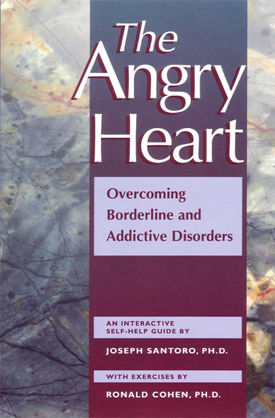Children who grow up in a psycho-traumatic environment develop borderline behavior patterns that are driven by fear, anger, and incredible sadness. As these children grow into young adults, they seek out ways of coping with their intensive and unstable feelings and behavior.
Children who grow up in a psycho-traumatic environment develop borderline behaviour patterns that are driven by fear, anger, and incredible sadness. As these children grow into young adults, they seek out ways of coping with their intensive and unstable feelings and behaviour. Some will turn to “pleasure” addictions such as alcohol, drugs, or sex and others will turn to “pain” addictions such as cutting, burning, or putting themselves at risk with reckless driving and so forth. Self-destructive behaviours damage, and eventually destroy, the good in their lives. In time, they are left alone and hurting in the Borderline Zone. Ultimately, “ugly” truth heals better than “soothing” denial. Use these recovery exercises as a basic guide to help yourself explore different patterns of maladaptive behaviour.
Recovery Exercise 4.1: The Maturity/Immaturity Paradox
The objective of this recovery exercise is to understand how maturity/immaturity paradox may be at work and gain insight into resolving this paradox.
Some people find themselves to be mature beyond their years in some ways, such as with regard to survival skills. These people may find themselves to be relatively naïve in many other ways, such as with regard to dealing with outside frustrations or their own anger. In the past, in what ways do you think you were mature or experienced beyond your years?
Today, in what ways do you see yourself as more mature or experienced than most people who are the same age as you? In the past, in what ways do you think you were relatively naïve in the ways of the world? Today, in what ways do you think you remain relatively naïve in the ways of the world?
Recovery Exercise 4.2: How Do You Spell Relief?
It helps to explore and understand the mechanism used to achieve a sense of relief, calm, or freedom from stress, worry, or pain. Relief of emotional and physical pain can be sought and achieved in many ways, some of the adaptive and some of them maladaptive. Discuss the ways that you have attempted to relieve emotional or physical pain in the past. In what ways do you think these attempts were mature or immature? Talking to another look at the situations that caused the stress or pain, in what ways do you think the pain could have been relieved more effectively?
Recovery Exercise 4.3: “When Things Are Too Good” or “Time to Self-Destruct"
The objective is to understand self-destructive mechanisms that may become active when things seem too good.
Some people seem to have a low tolerance for things going too well in their lives. Just when they seem to have met the right person, started the right job, or in some way begun a meaningful experience, they seem to sabotage the positivity and somehow replace it with negativity. Have you ever sabotaged something good in your life? How? Why? Is there a part of you that feels that you do not deserve to have good things happen to you? How did these feelings arise? What needs to happen in order for you to feel that you deserve good things to happen to you?
Recovery Exercise 4.4: Of Emptiness and Nothing
The objective is to understand how a void in one’s life may be filled in some maladaptive way.
Some people experience a gaping void or emptiness in their lives that they try to fill in some way. Have you ever experienced a void or emptiness in your life? How would you describe that void? How would you describe your attempts to fill that void? How stressed have you felt in your attempts to fill that void? What will it take to genuinely fill that void?
It is helpful to understand how feelings experienced in the hands of someone in the past may be replaced by others in the future. The same emotions and painful feelings I cause my significant other to feel, my parents made me feel years before.
Can you identify with the notion of experiencing some emotion or feeling at the hands of one person, only to have another person experience many of the same emotions or feelings as a result of your own actions? What memories does the experience of these emotions or feelings call up in you? Why might you have a conscious or unconscious need for others close to you experience these same emotions or feelings? Do you think it is possible for you to allow someone to get close to you without pushing him or her away?
These recovery exercises are adapted from the book The Angry Heart written by Dr. Joseph Santoro and Dr. Ronald Cohen. Dr. Joseph Santoro is one of the founding members of Blue Sky Behavioral Health. Blue Sky offers individualized outpatient as well as residential treatment programs for mental health disorders such as borderline personality disorder treatment. Our supportive and licensed clinical staff can make a major difference in your life. Learn how to live life well by contacting our facility today. Call (888) 822-7348 or visit us online at https://blueskyrecovery.com/





